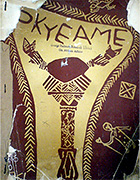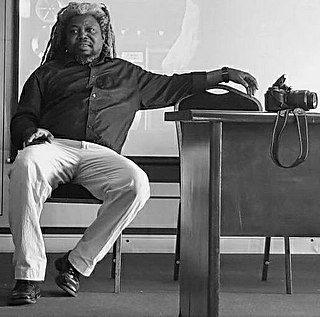
Ama Ata Aidoo was a Ghanaian author, poet, playwright, politician, and academic. She was Secretary for Education in Ghana from 1982 to 1983 under Jerry Rawlings's PNDC administration. Her first play, The Dilemma of a Ghost, was published in 1965, making Aidoo the first published female African dramatist. As a novelist, she won the Commonwealth Writers' Prize in 1992 with the novel Changes. In 2000, she established the Mbaasem Foundation in Accra to promote and support the work of African women writers.
African literature is literature from Africa, either oral ("orature") or written in African and Afro-Asiatic languages. Examples of pre-colonial African literature can be traced back to at least the fourth century AD. The best-known is the Kebra Negast, or "Book of Kings."

Nii Ayikwei Parkes, born in the United Kingdom to parents from Ghana, where he was raised, is a performance poet, writer, publisher and sociocultural commentator. He is one of 39 writers aged under 40 from sub-Saharan Africa who in April 2014 were named as part of the Hay Festival's prestigious Africa39 project. He writes for children under the name K.P. Kojo.
ICALEL is an acronym for the Calabar International Conference on African Literature and the English Language founded and chaired by African scholar and critic Ernest Emenyonu. At the centre of the conference are African writers and critics from all over the world. The first conference entitled “The Woman as a Writer in Africa” was held at the University of Calabar auditorium in May 1981 and Ghanaian writer Ama Ata Aidoo was keynote speaker. The themes of 1982, namely "Literature in African Languages" and "Writing Books for Children", featured Ngũgĩ wa Thiong'o and Bessie Head as keynote speakers. The many notable African writers who have featured at the conference over the years include Cyprian Ekwensi, Chinua Achebe, Wole Soyinka, Chinweizu, Dennis Brutus, Buchi Emecheta, Flora Nwapa, Elechi Amadi, Ken Saro Wiwa, Chukwuemeka Ike, Nuruddin Farah, Syl Cheney-Coker, to mention a few.

Efua Theodora Sutherland was a Ghanaian playwright, director, dramatist, children's author, poet, educationalist, researcher, child advocate, and cultural activist. Her works include the plays Foriwa (1962), Edufa (1967), and The Marriage of Anansewa (1975). She founded the Ghana Drama Studio, the Ghana Society of Writers, the Ghana Experimental Theatre, and a community project called the Kodzidan. As Ghana's earliest playwright-director, she was an influential figure in the development of modern Ghanaian theatre, and helped to introduce the study of African performance traditions at university level. She was also a pioneering African publisher, establishing the company Afram Publications in Accra in the 1970s.

Lesbian literature is a subgenre of literature addressing lesbian themes. It includes poetry, plays, fiction addressing lesbian characters, and non-fiction about lesbian-interest topics.
Postcolonialism is the critical academic study of the cultural, political and economic legacy of colonialism and imperialism, focusing on the impact of human control and exploitation of colonized people and their lands. The field started to emerge in the 1960s, as scholars from previously colonized countries began publishing on the lingering effects of colonialism, developing a critical theory analysis of the history, culture, literature, and discourse of imperial power.

Okyeame was a literary magazine founded by the Ghana Society of Writers in the post-Independence era, which saw the rapid rise of a new generation of thinkers, writers and poets in the country. The first issue of Okyeame appeared in 1960, and issues were published, at irregular intervals, up until 1972. Inspired by Kwame Nkrumah, the first Prime Minister of Ghana, the publication sought to explore the experiences of Africa from a new intellectual framework. Writers published in the magazine include its first editor Kofi Awoonor, Efua Sutherland, Ayi Kwei Armah and Ama Ata Aidoo.
Anowa is a play by Ghanaian writer Ama Ata Aidoo that was published in 1970, after Aidoo returned from Stanford University in California to teach at the University of Cape Coast. Anowa is based on a traditional Ghanaian tale of a daughter who rejects suitors proposed by her parents Osam and Badua, and marries a stranger who ultimately is revealed as the Devil in disguise. The play is set in the 1870s on the Gold Coast, and tells the story of the heroine Anowa's failed marriage to the slave trader Kofi Ako.

Changes: a Love Story is a 1991 novel by Ama Ata Aidoo, chronicling a period of the life of a career-centred Ghanaian woman as she divorces her first husband and marries into a polygamist union. It was published by the Feminist Press.
Yvette Christiansë is a South African-born poet and novelist. She currently lives in New York City and teaches at Barnard College. She has also taught at Fordham University, also in New York City.

Yaba Badoe is a Ghanaian-British documentary filmmaker, journalist and author.
Wangui wa Goro is a Kenyan academic, social critic, researcher, translator and writer based in the UK. As a public intellectual she has an interest in the development of African languages and literatures, as well as being consistently involved with the promotion of literary translation internationally, regularly speaking and writing on the subject. Professor Wangui wa Goro is a writer, translator, translation studies scholar and pioneer who has lived and lectured in different parts of the world including the UK, USA, Germany and South Africa.
The Organization of Women Writers of Africa (OWWA) is an organization for women writers in Africa. Founded in 1991, the OWWA aims to promote the oral and written literature of African women, and address issues concerning publishing, censorship and human progress.
Esi Sutherland-Addy is a Ghanaian academic, writer, educationalist, and human rights activist. She is a professor at the Institute of African Studies, where she has been senior research fellow, head of the Language, Literature, and Drama Section, and associate director of the African Humanities Institute Program at the University of Ghana. She is credited with more than 50 publications in the areas of education policy, higher education, female education, literature, theatre and culture, and serves on numerous committees, boards and commissions locally and internationally. She is the daughter of writer and cultural activist Efua Sutherland.

The Aké Arts and Book Festival is a literary and artistic event held annually in Nigeria. It was founded in 2013 by Lola Shoneyin, a Nigerian writer and poet, in Abeokuta. It features new and established writers from across the world, and its primary focus has been to promote, develop, and celebrate the creativity of African writers, poets, and artists. The Aké Arts and Book Festival has been described as the African continent's biggest annual gathering of literary writers, editors, critics, and readers. The festival has an official website and a dedicated magazine, known as the Aké Review.
Valerie Tagwira is a Zimbabwean writer who is a specialist obstetrician-gynecologist by profession. Her debut novel The Uncertainty of Hope, published in 2006 by Weaver Press, won the 2008 National Arts Merit Awards (NAMA) Outstanding Fiction Book.

Nana Sandy Achampong is a Ghanaian media practitioner, novelist, poet and educator. He has worked in the fields of journalism, public relations, advertising, marketing, the visual arts and literature in Ghana, the United Kingdom and the United States. He is an author with books that cover the different genres of poetry, play, for children, fiction, non-fiction, Christian, media and anthology. He currently teaches at the African University College of Communications, where he is also the Director of the Ama Ata Aidoo Centre for Creative Writing.
The Dilemma of a Ghost is a play by Ghanaian writer Ama Ata Aidoo that was first performed in March 1964 for three nights at the Open Air Theatre of the University of Ghana, Legon, where the author was in her final year of studies, a few months away from graduating. The play was published by Longman the following year, making Aidoo the first published African woman dramatist. It was subsequently published in an edition with Aidoo's second play, Anowa (1970), both works dealing with the differences between Western culture and African traditions.









